The 100 days of the trump administration: a source of shame for the majority of americans, and even remorse for some of his voters
56% of Americans are currently ashamed of the occupant of the White House, this feeling being particularly widespread among young people under the age of 25 (60%), CSP+ (60%), black people (69%) or those unaffiliated with any religion: 77% among atheists or agnostics.
However, it doesn’t only affect predominantly Democratic circles: almost a quarter of Republican supporters (23%) are ashamed of their President Donald Trump.
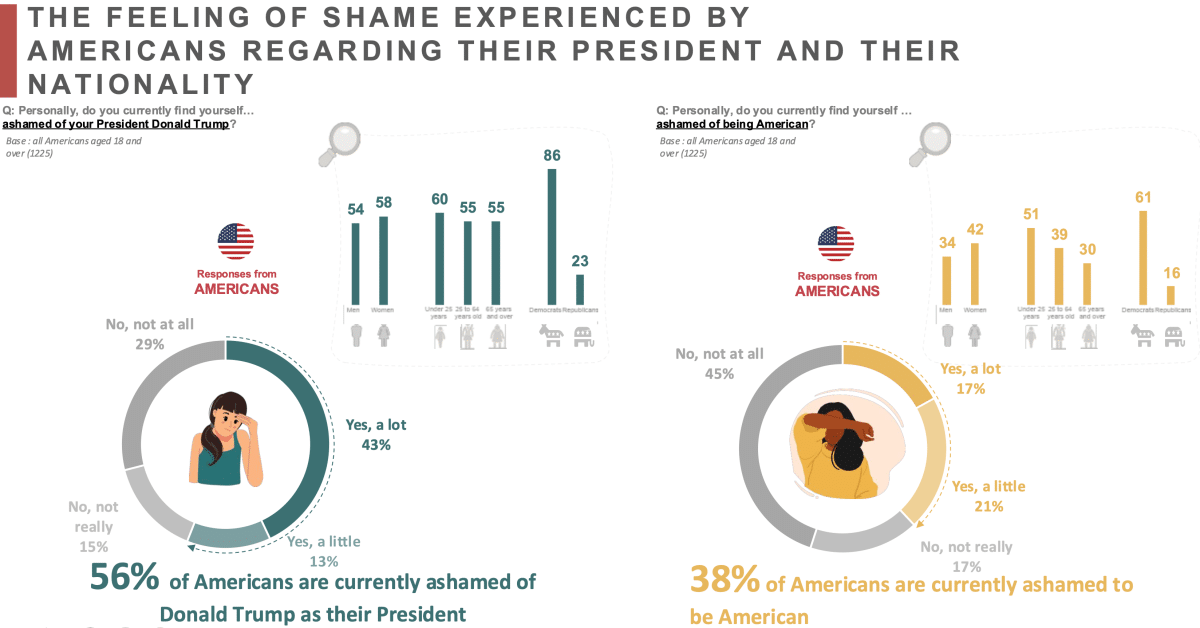
Probably because of the image that Donald Trump projects of the USA worldwild, the shame felt about the American president is also weighing on national sentiment: 38% of those polled say they are ashamed to be an American, particularly in progressive segments such as young people (51%) or those with a postgraduate degree (42%). But this feeling of national humiliation also affects citizens generally more marked to the right, such as those describing themselves as “very patriotic” (34%).
Today, one in four Trump voters (24%) regrets having voted for the real estate magnate in the November 2024 presidential election.
And this regret is particularly high among Trump voters under 35 (33%), those belonging to an ethnic minority (e.g. 34% of Hispanics, 38% of blacks) or in the ranks of “moderate” Republican supporters (33%).
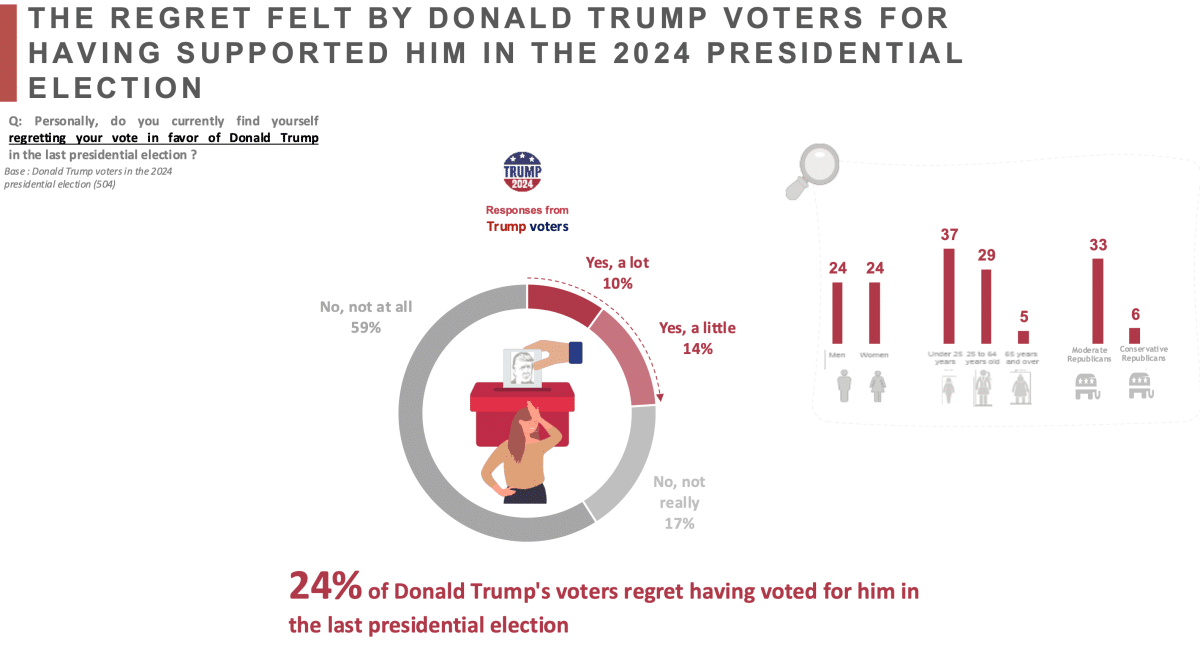
An american president’s popularity is at its lowest level since his return to power on january 20
Today, only 44% of American voters approve of “the way Donald Trump is handling his duties as President”, the lowest approval rating observed since he took office, if put into perspective with the measurements of the Yougov barometer built on the same field and using the same formulations.
In its first three months, the approval rating of the second Trump administration fell by 6 points among the electorate as a whole, with a significant drop among male voters (-9 points between January 28 and April 22, to 48%), black voters (-9 points, to 14%) and politically independent voters (-9 points, to 32%).
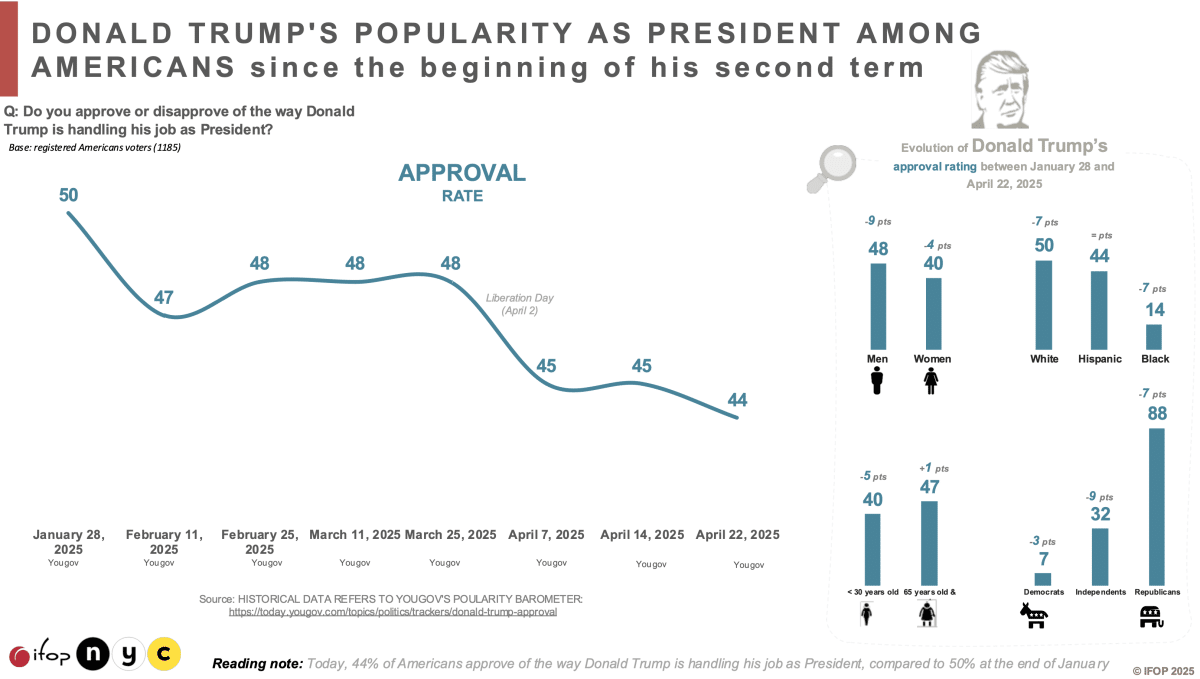
According to the Ifop study, rejection of his action is particularly strong among women (55%), modest households (63% among those earning less than $25,000/year) and ethnic minorities such as black people (69%). More broadly, this disapproval appears to be strongly linked to voters’ level of religious commitment, with a peak of 70% among convinced atheists.
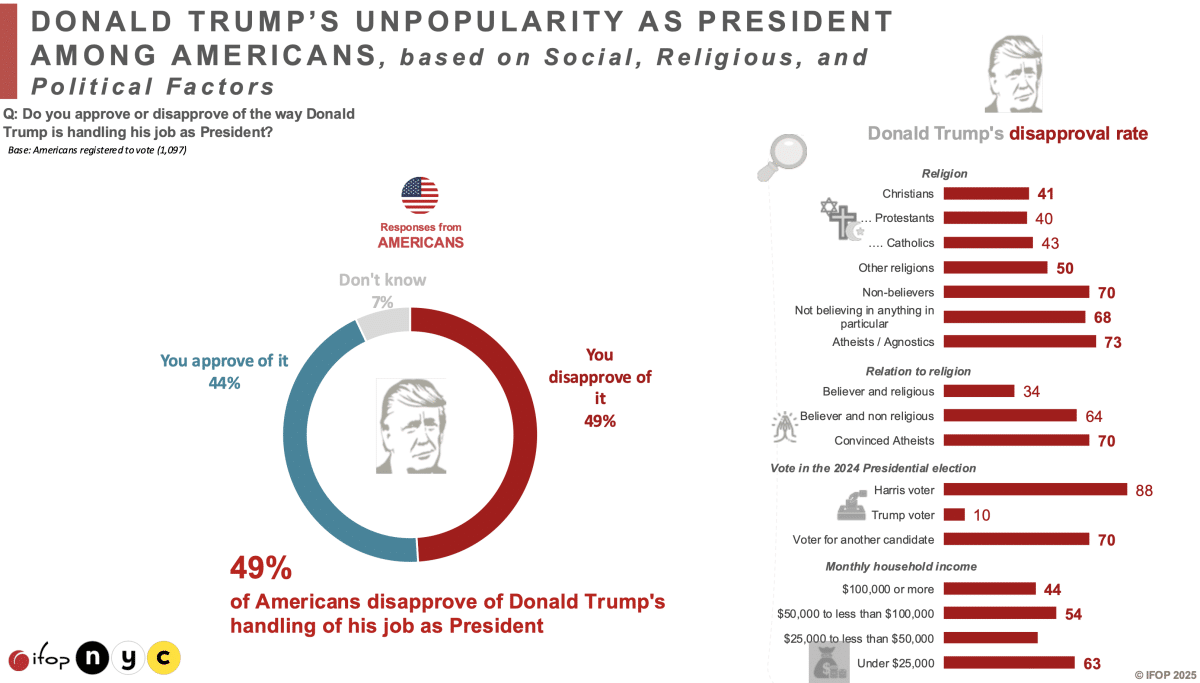
A Trump administration rather at odds with public opinion on international issues
The rapprochement with Russia initiated by Donald Trump on the Ukrainian issue is far from being followed by his constituents: two-thirds of Americans (66%) want to continue to support Ukraine against Russia, revealing a clear gap between American public opinion and Trumpian rhetoric centered around an imminent end to U.S. aid to Kyiv.
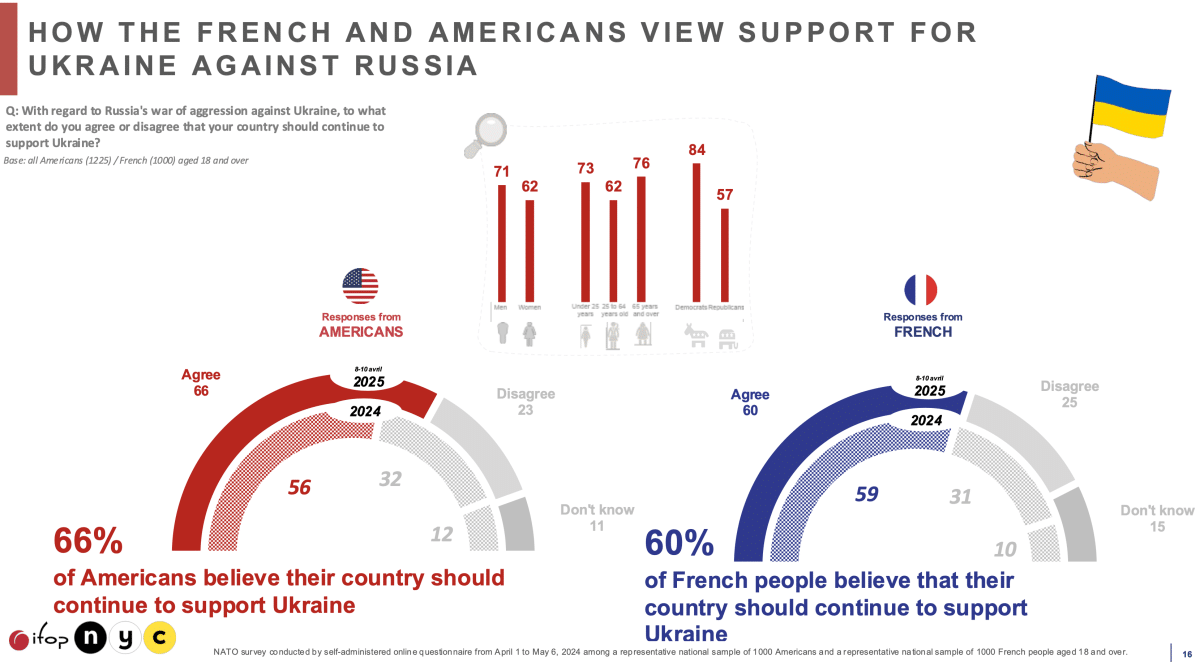
Significantly up on last spring (+10 points since May 2024), this support for the Ukrainian cause even transcends the American partisan divide, judging by the proportion of Republicans in favor of it: 57%, a lower proportion than among Democrats (84%), but a majority nonetheless.
This relative consensus can also be observed across different socio-demographic categories: 71% of men and 62% of women, 73% of 18-24 year-olds and 76% of over-65s, 67% of whites and 65% of blacks support Ukraine. This unusual convergence suggests that the Ukrainian cause mobilizes fundamental values (national sovereignty, resistance to aggression, defense of democracy) that transcend traditional cleavages in American politics.
In France, opposition to support for Ukraine as a marker of the far right
In France, while support for Ukraine is in the majority (60%), opposition to this aid reveals a specific political divide: 53% of French people on the far right do not wish to continue supporting Ukraine, compared with only 15% on the left and center-left, and 19% on the center-right.
This particular hostility on the part of the French far-right to support for Ukraine can be explained by ideological affinities with Vladimir Putin’s regime, perceived as a defender of traditional values in the face of a decadent West, but also by an anti-American and anti-NATO stance traditional in this segment of the electorate.
Thus, 40% of Rassemblement National sympathizers and 42% of RN voters oppose support for Ukraine, illustrating the persistence of a significant Russophile current on the French far right.
Announced by Donald Trump on April 2 (Liberation Day) before being amended on April 9[1] , the increase in tariffs is not to the liking of a majority of Americans either: 49% disapprove of his choice “to increase tariffs on products coming from abroad, a minimum of 10% on goods imported into the United States”, against 45% who approve.
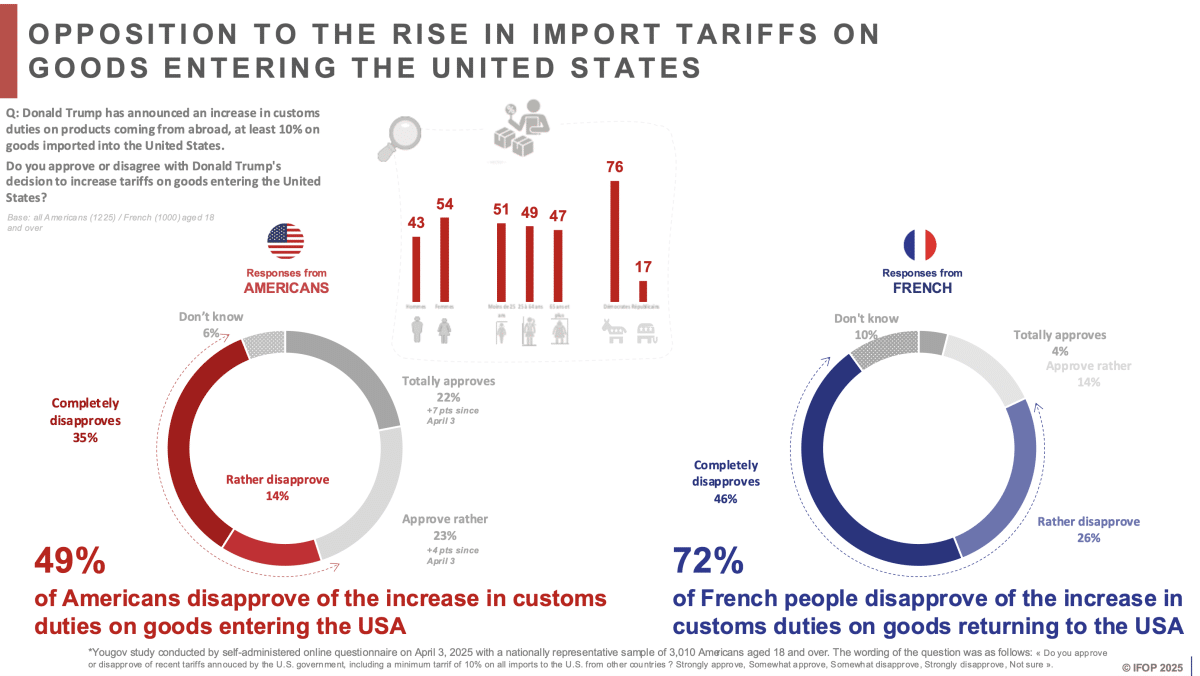
[1] Donald Trump has launched an all-out trade war, targeting China first and foremost, but also the European Union (EU), on which he has imposed an increase in customs tariffs (+10% on all goods since April 9, +25% on aluminum and automobiles) that have so far gone unanswered by Brussels.
In the United States, opposition to this pricing policy follows a clear partisan divide: 76% of Democrats disapprove of these measures, compared with just 17% of Republicans, reflecting the extreme political polarization of American society. It is also strong among American women (54%, versus 43% among men), young people aged 18-24 (51%), and the most modest households (54%; less than $25,000/year), illustrating concerns about purchasing power.
Approval of tariffs on both sides of the Atlantic
The gap between French and American approval of these measures is spectacular: 72% of the French disapprove of higher tariffs on goods entering the United States, compared to just 49% of Americans. Conversely, only 18% of French people approve of these measures, three times less than Americans (45%). This difference is partly explained by the direct economic stakes for both countries: France, as an economy more dependent on exports, is potentially more vulnerable to American protectionist measures. Furthermore, the absence of partisan political stakes for the French facilitates a more unanimous rejection.
In the United States, public opinion reflects the extreme polarization of society: opposition to this tariff policy follows a particularly clear partisan divide, with 76% of Democrats disapproving of these measures, compared to just 17% of Republicans. This divide is mirrored in the 2024 presidential vote: 81% of Kamala Harris voters oppose these measures, compared with just 15% of Donald Trump voters. The analysis also reveals a pronounced ideological divide: 63% of “very progressive” and 75% of “fairly progressive” voters disapprove of the tariff hikes, compared with just 20% of “fairly conservative” and 9% of “very conservative” voters.
On issues such as gender, immigration and the environment, Trump’s policies tend to be more in tune with his constituents
On questions of gender identity, the President’s “anti-woke” positions are supported by a majority of Americans, judging by their support for banning transgender athletes from competing in women’s sports (62%) or for revising the legal definition of the sexes to accept only two categories (57%).

The gap between the USA and France when it comes to gender identity policies is striking. Banning transgender athletes from competing in women’s sports is the measure with the highest support in the USA (62%), while it is overwhelmingly rejected in France (only 28% approve). Similarly, the legal definition recognizing only two genders is approved by 57% of Americans versus 38% of French, and the restriction of access to the army for transgender people by 38% of Americans versus only 18% of French.
These divergences reflect profoundly different cultural and political contexts. While in a highly secularized country like France, questions of feminism or gender identity are relatively consensual[1] , in the United States, they have become an essential marker of partisan positioning, at the heart of the “culture wars” that now structure the national political landscape. The divide between Democrats and Republicans also reflects the growing political instrumentalization of gender identity issues, with the Trump administration implementing measures that galvanize its base while further polarizing American public debate.
Similarly, the promotion of oil exploitation is approved by a majority (54%) of Americans, unlike other environmental measures such as the abolition of the obligation to use paper straws (46% approval) and, above all, the withdrawal of the United States from the Paris Climate Agreement (30% approval).
This massive rejection, even among a significant part of the Republican electorate, suggests that the climate isolationism advocated by Trump comes up against an environmental concern that partially transcends traditional partisan divides.

[1] An Ifop study carried out in October 2022 showed that feminism enjoys greater support in French society than in an American society that is much more polarized on the subject: barely one American in two (52%) claims to be a feminist, compared with two-thirds of French people (67%).
These divisions also reflect differing conceptions of economic development. For a significant part of the Republican electorate, the exploitation of domestic oil resources is perceived as a lever for energy independence and economic prosperity, while for the Democratic electorate, it represents above all a threat to the environment.
On the other hand, while the deportation of illegal immigrants enjoys majority support in American opinion (56%), this is not the case for challenging birthright citizenship for children of non-citizen immigrants, which is strongly favored by a minority (35%), as is the abolition of Diversity, Equity, and Inclusion programs: only 39% of Americans approve, mainly men (48%, versus 30% of women), whites (43%, versus 19% of blacks) and seniors (71%, versus 29% of young people).
The abolition of Equity, Diversity and Inclusion (EDI) programs is therefore a particularly telling marker of America’s socio-demographic divides.

But it’s the ethno-racial divide that is most striking: 43% of whites approve of this measure, compared with only 19% of blacks and 18% of other “races”. This gap is easily explained by the fact that these minority populations are the main beneficiaries of EDI programs, which they perceive as tools for correcting the systemic discrimination they suffer.
By calling into question such fundamental principles as the right to land, the Trump administration is accentuating the existential dimension of the “culture wars” that are tearing the country apart.
The viewpoint of François Kraus of Ifop, Director of the Politics & News Department
In conclusion, this survey reveals that American and French societies are deeply divided in terms of their vision of the world and their relationship to major contemporary societal issues. While divisions are particularly marked in the United States along partisan lines that have now become entrenched, the French electorate is less polarized and less fractured. The administration is thus implementing a divisive ideological program, massively rejected in France, but not so unpopular in the United States due to an extreme polarization that is entrenched among four out of ten Americans. Support for these controversial measures follows deep socio-demographic fault lines that largely cut across partisan divides, confirming in effect the growing political polarization of American society, where partisan affiliation is becoming a global social identity that determines positions on virtually all subjects.
The results concerning support for Ukraine, however, come as a surprise: in this hyperpolarized landscape, aid to Kyiv in the face of Russian aggression appears to be one of the rare subjects that partially transcends partisan cleavages in the United States, revealing a potential mismatch between presidential rhetoric and the expectations of public opinion, including Republican opinion. This paradox could constitute a significant constraint for the Trump administration in the months ahead, suggesting that certain international consensuses resist the centrifugal forces of polarization.
To quote this study, use at least the following formulation
“Ifop study for NYC.eu conducted by online self-administered questionnaire among a nationally representative sample of 1,225 Americans aged 18 and over (April 8-10, 2025), and a nationally representative sample of 1,000 French people aged 18 and over (April 9-10, 2025). For comparison purposes, a probability sample of this size would have a margin of error of at most ±3% (19 times out of 20)”.

